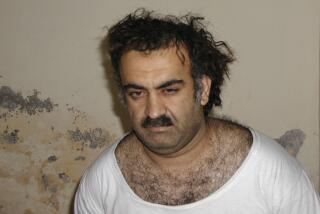U.S. Indictments in ’96 Bombing Roil Saudi Arabia
WASHINGTON — Saudi Arabia is reacting angrily to the U.S. criminal charges filed last week in connection with the 1996 bombing of an American military barracks there, adding a new irritant to U.S.-Saudi relations at a time when Secretary of State Colin L. Powell hopes to win the support of the kingdom for Middle East peace efforts.
“The Americans never informed us or coordinated with us on this issue,” Prince Nayif ibn Abdulaziz, the interior minister, said in an interview published Saturday in Al Riyadh, a daily newspaper that usually reflects government views.
Nayif’s complaint, echoed by other Saudi leaders, that the Bush administration sought to bypass the Saudi legal system came at a particularly sensitive time in Washington’s Mideast diplomacy. The United States on Thursday charged 14 suspected Middle Eastern terrorists, including 13 Saudi citizens, in the bombing that killed 19 Air Force personnel and wounded 372 other Americans.
Powell plans to confer Friday in Paris with Saudi Crown Prince Abdullah, the country’s de facto ruler, on the way back to Washington from a Mideast trip designed to solidify a shaky Israeli-Palestinian cease-fire.
Powell hopes to persuade Abdullah and his Saudi colleagues to urge Palestinian Authority President Yasser Arafat to go all out to end nine months of violence and to reopen peace negotiations with Israel.
Although Saudi Arabia seldom takes an active role in Mideast peacemaking, the kingdom’s position as the home of Islam’s two holiest mosques gives it great authority on religious matters. Officials of the Clinton administration acknowledged that one reason for the collapse of last summer’s Camp David peace talks was Washington’s failure to line up Muslim support for Israel’s offer concerning the future of Jerusalem, a city revered by Muslims, Jews and Christians.
Abdullah, the slightly younger half-brother of the ailing King Fahd, has rebuffed Washington’s overtures in the past, complaining that U.S. policy leans too much toward Israel. But U.S. officials continue to court him, primarily because he seems to wield considerable influence in the Arab world.
At the same time, Saudi Arabia maintains a close strategic relationship with the United States, buying mostly American weapons for its military forces and allowing the U.S. to maintain military bases there.
Nevertheless, Abdullah, who is trying to consolidate power in the expectation that Fahd will be unable to regain his health, has sought to position himself as less pro-American and more pan-Arabist than his sibling. Saudi pique over the bombing indictments is likely to reinforce that position despite Powell’s desire to soften it.
In the newspaper interview, Nayif, who controls the kingdom’s police, said: “The trials must take place before Saudi judicial authorities, and our position on this question will not change. No other entity has the right to try or investigate any crimes occurring on Saudi lands.”
Nayif’s reaction seemed to preclude a U.S. trial for most of the suspects indicted Thursday. The interior minister said all but three of the suspects are already in Saudi jails, and even U.S. officials have conceded that many of the accused are in Saudi custody. The United States and Saudi Arabia do not have an extradition treaty.
Nayif also objected to the federal grand jury’s assertion that the terrorists were supported and directed by officials of the Iranian government. He said the Saudi investigation of the bombing had turned up no evidence of Iranian involvement.
That comment appeared to reflect Saudi concern that the indictments will chill the increasingly friendly relationship between Saudi Arabia and Iran, its rival across the Persian Gulf.
“The Saudis have been pleased that the relationship with Iran has improved,” said William B. Quandt, a Middle East expert in the Carter White House. “From the Saudi standpoint, that is a huge achievement.”
Quandt, now a professor at the University of Virginia, said the bombing indictments reinforce “a rising tone of [Saudi] irritation with American policy, particularly toward the Israeli-Palestinian conflict.”
Nayif’s interview came a day after a complaint about the indictments voiced by Prince Sultan ibn Abdulaziz, the Saudi defense minister, who is considered the most pro-American of the kingdom’s royal family.
The investigation of the bombing at the Khobar Towers barracks in Dhahran has roiled U.S.-Saudi relations from the start. Early in the drawn-out case, the FBI complained that the Saudis were obstructing its investigation. But on Thursday, FBI Director Louis J. Freeh was unstinting in his praise for Saudi investigators.
More to Read
Sign up for Essential California
The most important California stories and recommendations in your inbox every morning.
You may occasionally receive promotional content from the Los Angeles Times.










